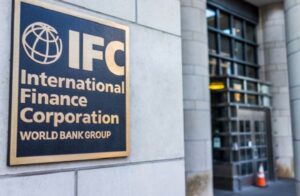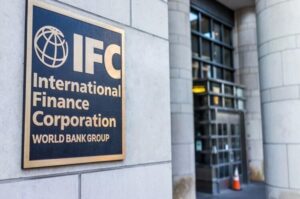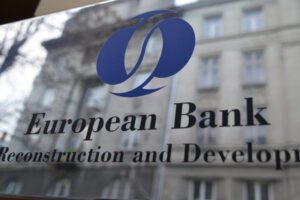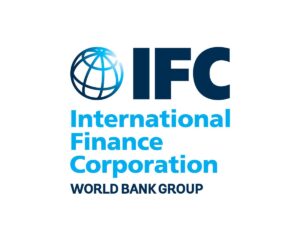
The International Finance Corporation (IFC) is launching a EUR20 mln risk-sharing facility for the Ukrainian subsidiaries of Hungary’s OTP Bank: OTP Bank and OTP Leasing, to support small and medium-sized enterprises (SMEs), especially those operating in the agribusiness sector or owned by women.
“IFC assumes half of the risk on a combined EUR40 million portfolio covering key segments of the Ukrainian economy,” the corporation said in a press release on Friday.
It is specified that these will be the first risk-sharing arrangements in Ukraine under the IFC Small Loan Guarantee Program, which is supported by the European Commission and which will help save jobs, provide essential goods and services, restore supply chains, as well as generate export revenues and budget revenues.
IFC recalls that in 2021, SMEs accounted for 99.97% of all enterprises in Ukraine, generated about 60% of gross domestic product (GDP) and employed more than 7 million people. SMEs suffered significant losses in the second half of 2022, and now only 6% of them are doing business at the same levels as before Russia’s full-scale invasion.
“A strong private sector is key to Ukraine’s economic revival. Expanding access to finance for businesses is critical to counteract the macroeconomic instability and supply chain disruptions that are now severely hampering economic activity in the country,” IFC Vice President for Europe, Latin America and the Caribbean Alfonso Garcia Mora was quoted as saying in the release.
He added that IFC aims to ensure access to credit and stimulate innovation as a key prerequisite for Ukraine’s recovery.
As reported, initially IFC from the World Bank Group considered the project of providing partial risk coverage of new financing for Ukrainian OTP Bank and OTP Leasing for EUR60 mln – EUR30 mln for each financial institution, estimating its possible participation in risk coverage up to EUR30 mln.
OTP Bank was the eighth among 65 Ukrainian banks in terms of total assets (103.33 billion UAH) at the beginning of June this year. The Bank has 75 branches in Ukraine.
“OTP Leasing is the largest leasing company in Ukraine with the share of about 45% according to the results of the first quarter of this year. The CEO of OTP Leasing Andrey Pavlushin reported earlier that in the first half of 2023 the company financed Ukrainian clients for UAH 2.2 billion, which is 3-4% more than the indicator of the first half of 2022.

A $2 billion IFC program designed to ramp up support for Ukraine’s private sector and boost economic resilience amid Russia’s invasion of Ukraine is receiving new financial support from the Netherlands and Switzerland, IFC has said.
“The Netherlands will be providing $43 million to support Ukraine’s agricultural sector and ensure emergency liquidity for private companies in critical agri-related industries. Switzerland will provide $11 million to support Ukraine’s small-scale farmers,” IFC said in the press release.
IFC said that Ukraine’s private sector generated up to 70% of gross domestic product before Russia’s invasion and provided crucial jobs, goods, and services. In spite of one in five micro and smaller business closing (as of mid-April 2022), the sector continues maintaining strategic exports and providing taxes.
The private sector will also have a crucial role to play in the country’s reconstruction efforts, estimated at $411 billion as of February 2023 – far more than government and donors can muster alone, the corporation said.
“A strong private sector is essential to help Ukraine’s economy recover and support reconstruction efforts. We welcome the contributions made by the Netherlands and Switzerland and their strong support for Ukraine. Ukraine’s economy remains on life support, and we will continue working with other development partners to provide the guarantees and grants the private sector needs,” IFC’s Managing Director Makhtar Diop said in the press release.
IFC recalled that IFC’s $2 billion Economic Resilience Action (ERA) response package includes finance from IFC’s own account working alongside guarantees and concessional finance (or grants) from donor governments. It complements efforts IFC has made with its own capital to support the private sector in Ukraine without donor support. As of April 2023, IFC’s outstanding portfolio was nearly $300 million to private companies and financial institutions in Ukraine.
IFC expects to be able to leverage these donor funds from the Netherlands and Switzerland between 3-4 times, meaning these contributions can potentially support over $200 million of financing.

The International Finance Corporation (IFC) from the World Bank Group will enter the capital of a new fund managed by Horizon Capital – Horizon Capital Growth Fund IV (HCGF IV) with a contribution of $30 million, and the European Bank for Reconstruction and Development (EBRD) – with a contribution of $50 million.
According to the information on the corporation’s website, the project has been approved and the relevant documents are awaiting signing, this will be the first IFC investment in Ukraine since the start of a full-scale war that began in February 2022.
The EBRD clarified that its board of directors approved entry into HCGF IV on 6 September.
The target size of the new fund is $250 million. IFC specifies that the fund will invest primarily in fast-growing technology and export-oriented mid-cap companies operating in Ukraine and Moldova and competitive in the global market.
The fund is expected to invest $10-30 million to acquire minority stakes in 10-15 mid-cap companies worth $50-150 million.
According to the materials, HCGF IV is the successor to Emerging Europe Growth Fund III (EEGF III, 2017) and will follow a similar investment strategy focused on IT services and products, as well as e-commerce, innovative consumer products and fintech.
IFC recalls that it invested in EEGF III and EEGF II (2008), while the EBRD was an investor in EEGF III and EEGF II, as well as HCGF II.
IFC’s participation in the fund with equity capital, in an environment where the fund will not be able to raise this money in the market after the start of the war, will be critical to achieving the minimum first close of $100 million, and IFC’s continued participation will allow it to reach the final size of $250 million, the report says.
“This is a landmark event – despite the war, IFC decides to allocate money for investments in Ukraine. This should be a positive signal for other potential investors: you can and should start investing in the Ukrainian economy now,” the First Vice President commented on the IFC decision. Prime Minister of Economy of Ukraine Yulia Sviridenko.
According to the Ministry of Economy, the German Investment and Development Corporation (DEG), the Swiss Investment Fund for Emerging Markets (SIFEM), the Dutch Financial Company for Emerging Markets (FMO), the Western NIS Enterprise Fund, the Rockefeller Foundation are also planning to join the HCGF IV fund. and others.
Horizon Capital is a large investment company that manages five private equity funds (more than 40 institutional investors) with assets of $1.1 billion, including WNISEF (with a capital of $150 million), Emerging Europe Growth Fund (EEGF, $132 million), EEGF II ($370 million) and EEGF III ($200 million), as well as HCGF II ($258.3 million). The resources of these funds are invested in projects in Ukraine and Moldova.
The company currently has two founding partners, CEO Lenna Koszarna and head of investment committee Jeffrey Neal. The company’s offices are located in Kyiv and Chicago.

The International Finance Corporation (IFC), part of the World Bank Group (WB), plans to submit a $1 billion financing package for Ukraine to its Board of Directors in November, including direct lending, financial guarantees and trade finance instruments, the Deputy Minister said. economics Alexander Griban.
“It is expected that such financing will also mobilize private loan capital, because IFC usually finances no more than 30% of the project cost, including commercial banks in the financial consortium. Thus, the total volume of projects of Ukrainian enterprises that can be financed will be more than $ 3.3 billion,” he was quoted in a press release from the Economy Ministry on Friday.
Hryban added that IFC is also actively working with the European fund for sustainable development (EFSD), which has already received a request for $2 billion. According to him, these funds are also planned to be used to introduce financial instruments to support Ukraine.

Prime Minister of Ukraine Denys Shmygal invited the International Finance Corporation (IFC) from the World Bank Group to join the reconstruction of Ukrainian cities.
“The head of the Ukrainian government spoke about the scale of destruction as a result of Russia’s criminal actions and expressed hope for the support of the International Finance Corporation in the issue of restoring the housing stock and social infrastructure,” the press service of the government said after a meeting between Shmyhal and the managing director and executive vice IFC President Makhtar Diop.
According to him, Ukraine plans to carry out the restoration on the principles of a green economy.
The prime minister also noted that he was counting on IFC assistance in financing the restoration of the transport infrastructure of Ukrainian cities, especially those most affected by the actions of the occupiers.
“We are interested in creating a financial platform for the IFC, which will finance more Ukrainian cities. Today, attracting foreign investment in the restoration of critical and social infrastructure is one of the most important issues on the agenda of Ukraine,” the head of government added.
In addition, Shmyhal focused on the need to extend public-private partnership projects after Ukraine’s victory. In particular, this concerns the implementation of concession projects at airports, railway stations, seaports, as well as public-private partnership projects in the road industry.
“The resilience of the people of Ukraine is outstanding. Consider IFC as a strong and strategic partner that will play its part in supporting the private sector,” Diop tweeted after the meeting.

The International Finance Corporation (IFC) may provide Zaporizhia with a $55 million long-term loan to finance a package of initiatives aimed at improving energy efficiency, infrastructure development and transport logistics.
The board of directors plans to consider this project on February 15, 2021, the bank said on its website.
IFC plans to provide Zaporizhia with up to EUR 36.7 million of a loan from its own funds and to organize another EUR 18.3 million through the Managed Co-Lending Portfolio Program (MCPP).
It is assumed that the funds will be used for the installation of an intelligent traffic control system, street lighting and modernization of control centers, the purchase of electric buses, trolleybuses and related infrastructure, (reconstruction of traction equipment, substations, the purchase of road construction and cleaning equipment, as well as the reconstruction of roads and the development of public parks.
In addition, IFC will help develop a Smart City 2.0 strategy for Zaporizhia